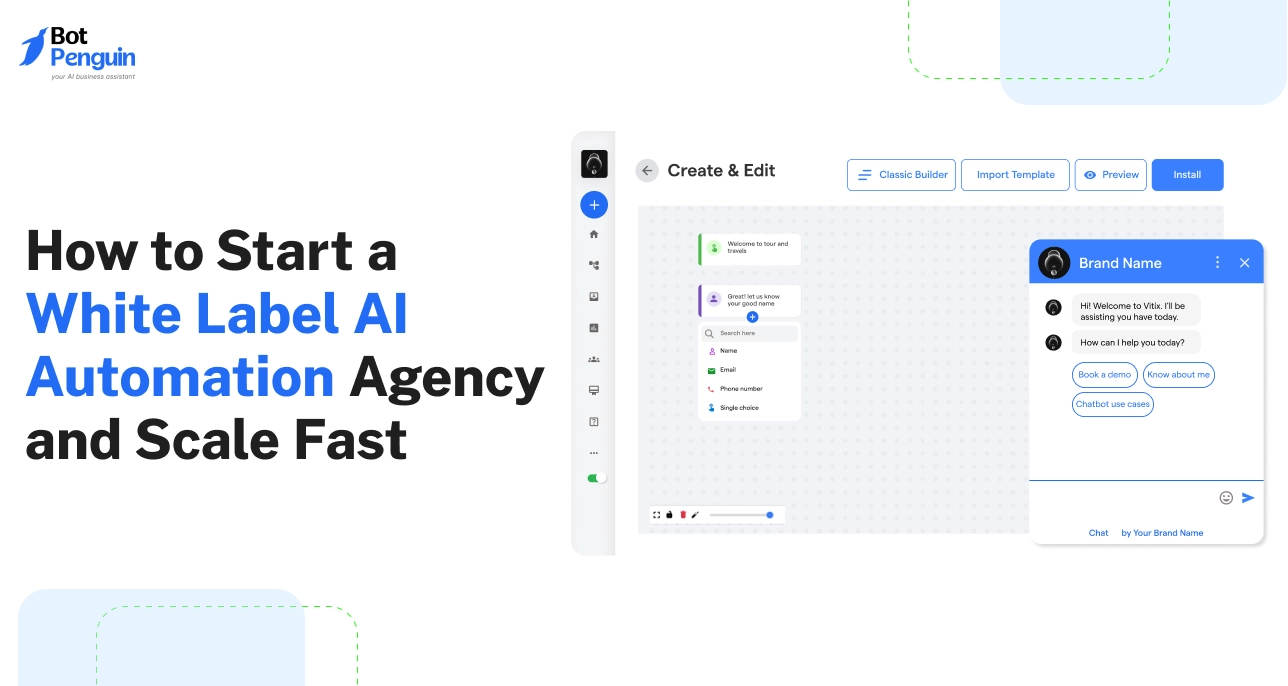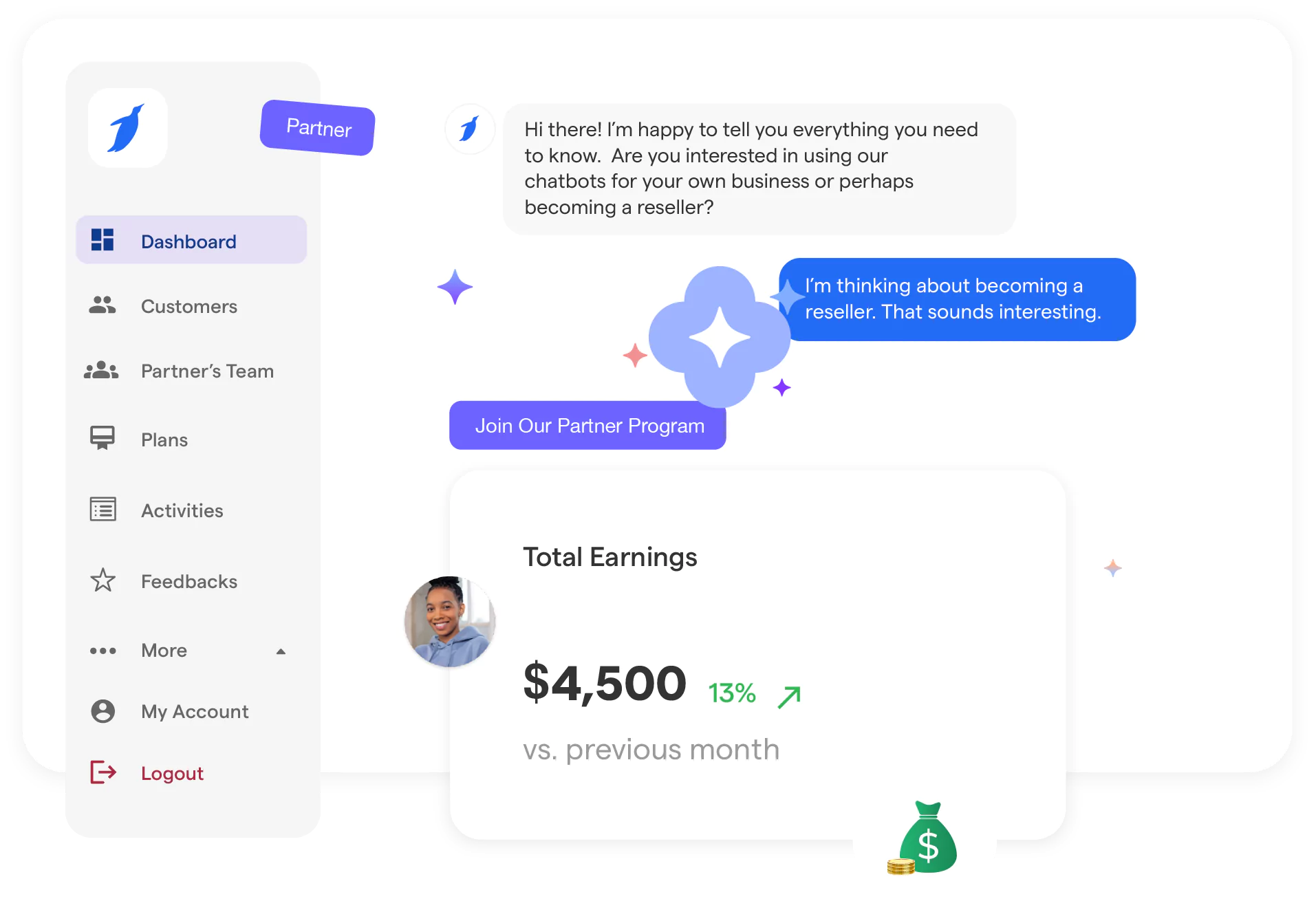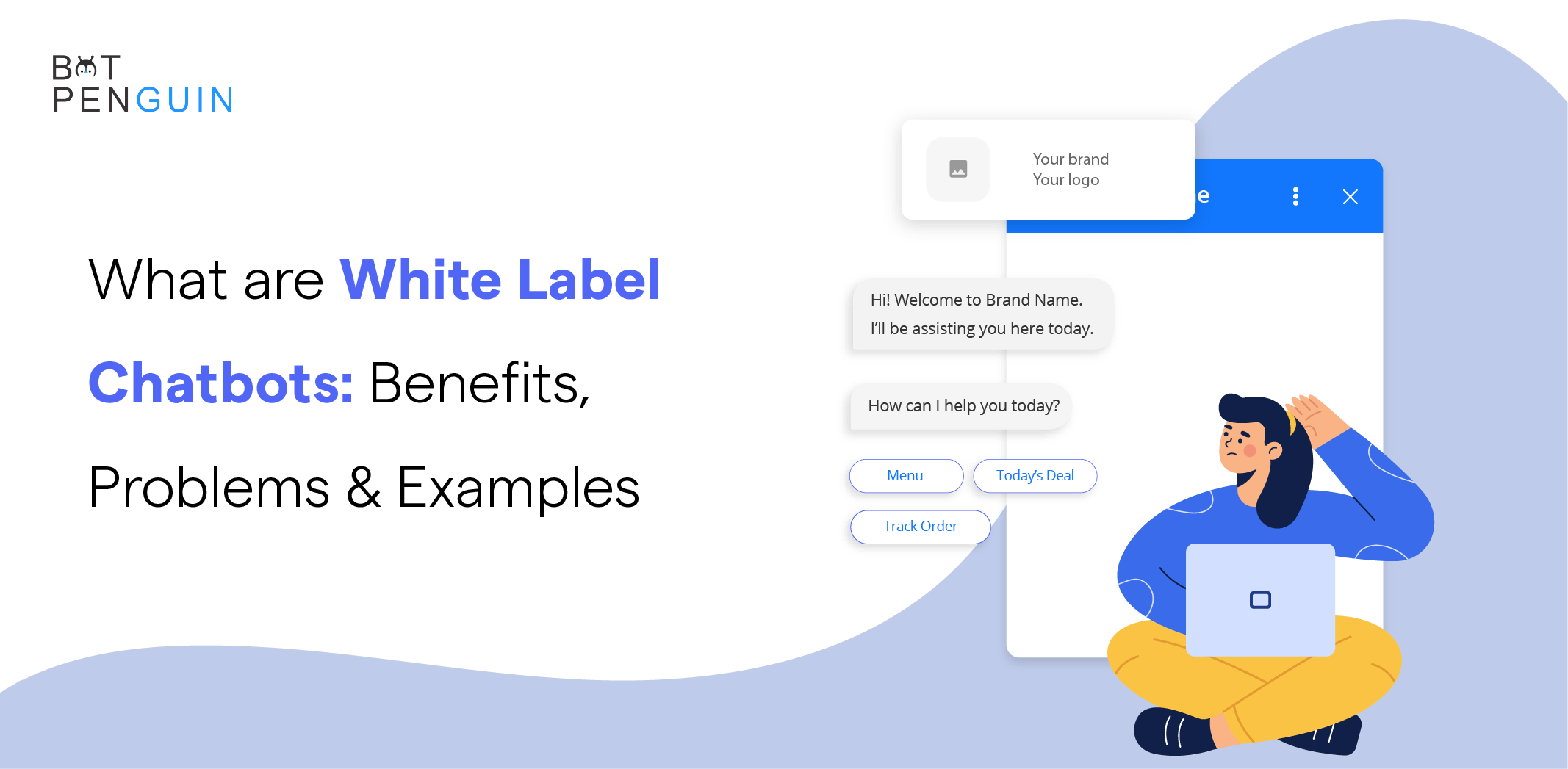Introduction
Automation is no longer optional. It is now the backbone of every digital business aiming to grow faster and operate smarter.
From marketing to customer engagement, AI-driven systems are powering the next wave of scalable success.
While big tech builds complex tools, thousands of smaller agencies and entrepreneurs are finding a smarter path through white label AI automation. It is the fastest way to launch a full-fledged automation business without writing a single line of code.
In this guide, you will learn how to start a white label AI automation agency, build your brand, and scale it quickly using proven systems, integrations, and client-ready tools that make automation accessible and profitable from day one.
What a White Label AI Automation Agency Means
Automation has become essential for modern businesses, but building advanced systems from scratch takes time, money, and technical skill.
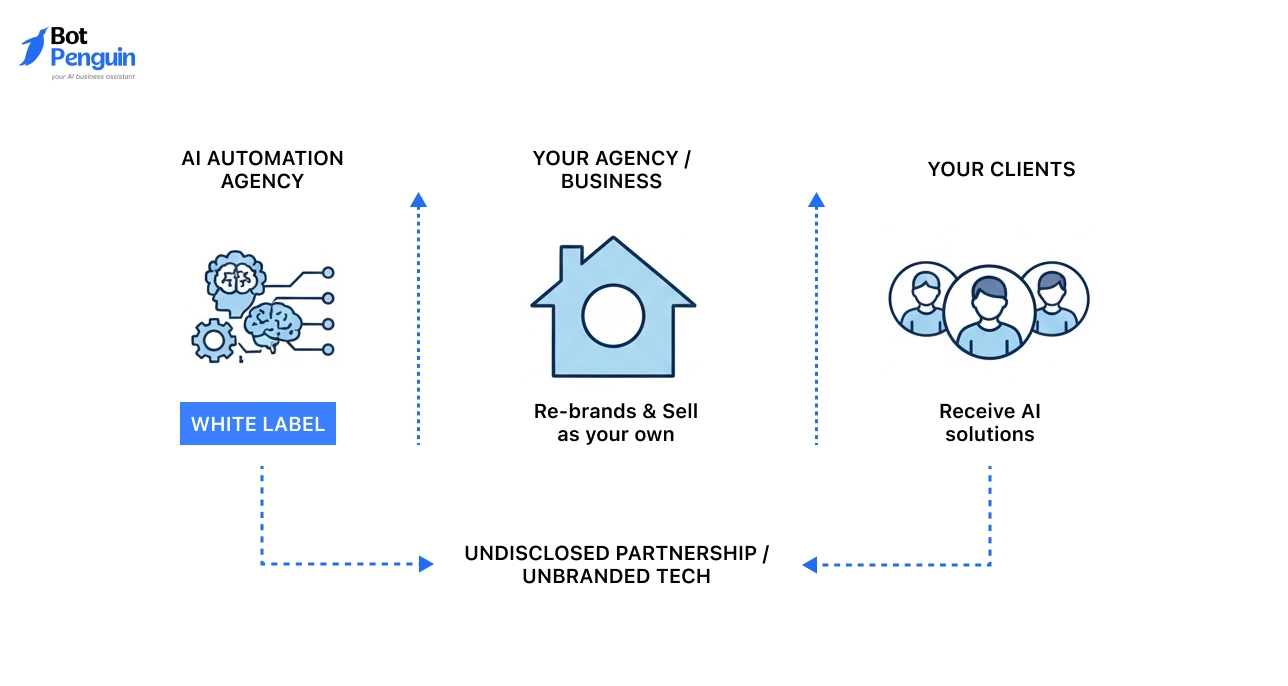
A white label AI automation agency removes those barriers by giving businesses a ready platform they can rebrand and sell as their own.
What It Is
A white label automation software is a pre-built platform that supports AI chat, voice, and workflow automation.
Agencies can add their name, logo, and colors to make it look like their own product. It lets them offer automation services without coding or maintaining complex systems.
Why It Matters
Building automation technology from the ground up requires developers, infrastructure, and constant updates. A white label setup provides everything ready-made.
You manage branding, clients, and sales while the technology and backend are handled for you. It saves months of work and helps you start generating revenue quickly.
How It Works in Real Scenarios
- A marketing agency can use AI chatbots to handle client leads automatically.
- A real estate firm can respond to property inquiries through AI chat.
- A customer service team can resolve common queries using automated replies.
- An eCommerce store can guide buyers and track orders through chat.
The Role of Platforms
Platforms such as BotPenguin make this process easy. They provide the base technology while giving agencies full control over branding, pricing, and client management.
It helps you start your automation agency faster and scale without worrying about development.
Starting a white label AI automation agency gives you an opportunity to offer high-value AI services under your brand.
The next section explains how to set up your agency step by step and start growing from day one.
Steps to Start a White Label AI Automation Agency
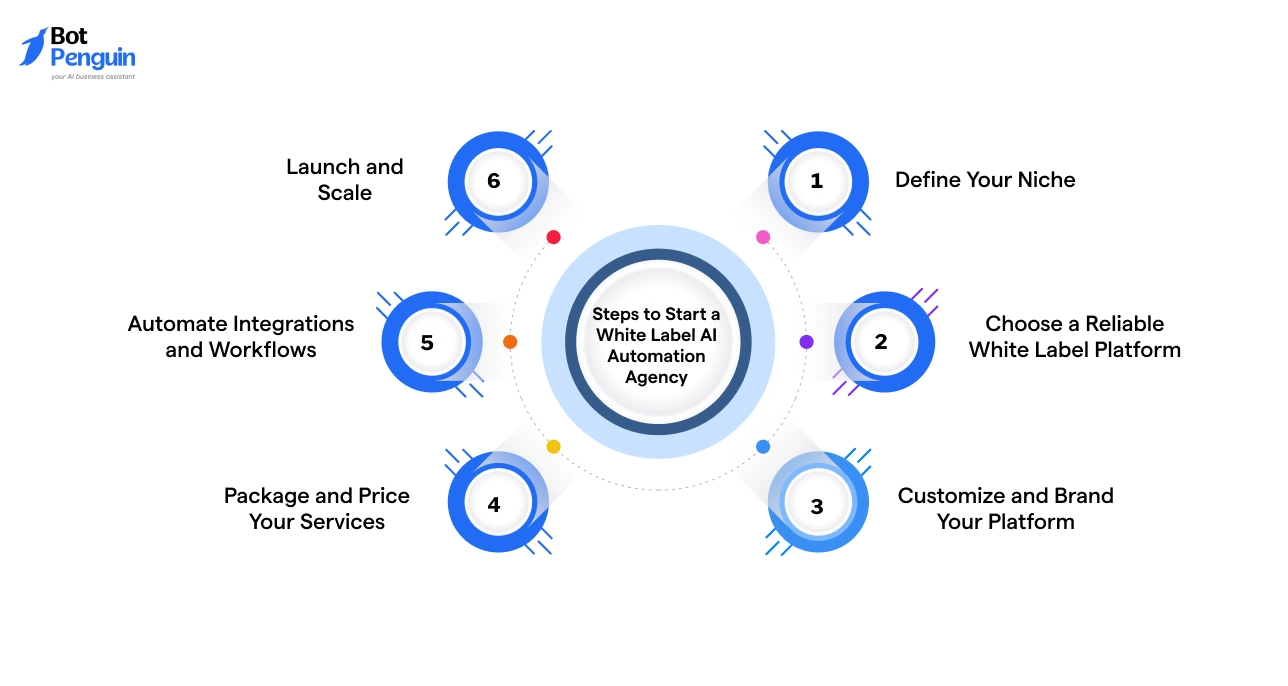
Once you understand how a white label model works, the next step is building your agency from the ground up. The process is practical and structured.
With the right white label AI platform, you can move from concept to launch within days instead of months. Platforms such as BotPenguin make this process easier by providing all the necessary tools for branding, automation, and client management.
Step 1: Define Your Niche
Start by identifying who your target clients are. Agencies that serve specific industries perform better because they solve focused problems.
For instance, real estate firms need chatbots for property queries, while eCommerce stores require order tracking automation. Knowing your niche helps you build relevant use cases and position your agency clearly in the market.
Step 2: Choose a Reliable White Label Platform
Selecting the right partner is the most important step. A reliable platform should offer scalability, data privacy, and strong integrations.
Tools such as BotPenguin help you start your agency quickly by offering a ready AI automation agency white label system that supports your brand identity and client operations.
It lets you focus on business growth while the platform handles backend management and performance.
Step 3: Customize and Brand Your Platform
Your agency should look unique and professional. Configure your dashboard, add your logo, brand colors, and domain.
A consistent brand presence builds trust and gives clients confidence that they are working with a dedicated automation company. Customization is essential for brand recall and professional credibility.
Step 4: Package and Price Your Services
Decide how you want to sell your automation services. Most agencies create different pricing tiers based on features such as chatbot deployment, workflow automation, or White Label AI voice agent.
Offer subscription models to generate recurring revenue. This approach helps you maintain predictable income and scale faster as more clients join.
Step 5: Automate Integrations and Workflows
Automation is the foundation of your business. Use integration tools like N8N or Zapier to connect with CRMs such as HubSpot or Zoho.
A white label AI platform like BotPenguin already supports these integrations, helping you automate repetitive tasks, manage client communications, and deliver better performance without manual intervention.
Step 6: Launch and Scale
Once your systems and pricing are ready, start onboarding clients. Focus on early results and client feedback to refine your offerings. As your client base grows, scaling becomes easier when your backend is stable.
BotPenguin supports scaling with built-in analytics, subscription tracking, and continuous feature updates. It helps agencies expand confidently without worrying about maintenance or uptime.
Building a white label AI automation agency follows a clear roadmap of defining, branding, and automating with the right tools.
Once your foundation is in place, the next step is to focus on growth strategies that help your agency scale faster and operate efficiently. The following section explains how to achieve that growth systematically.
How to Grow and Manage Your White Label AI Automation Agency
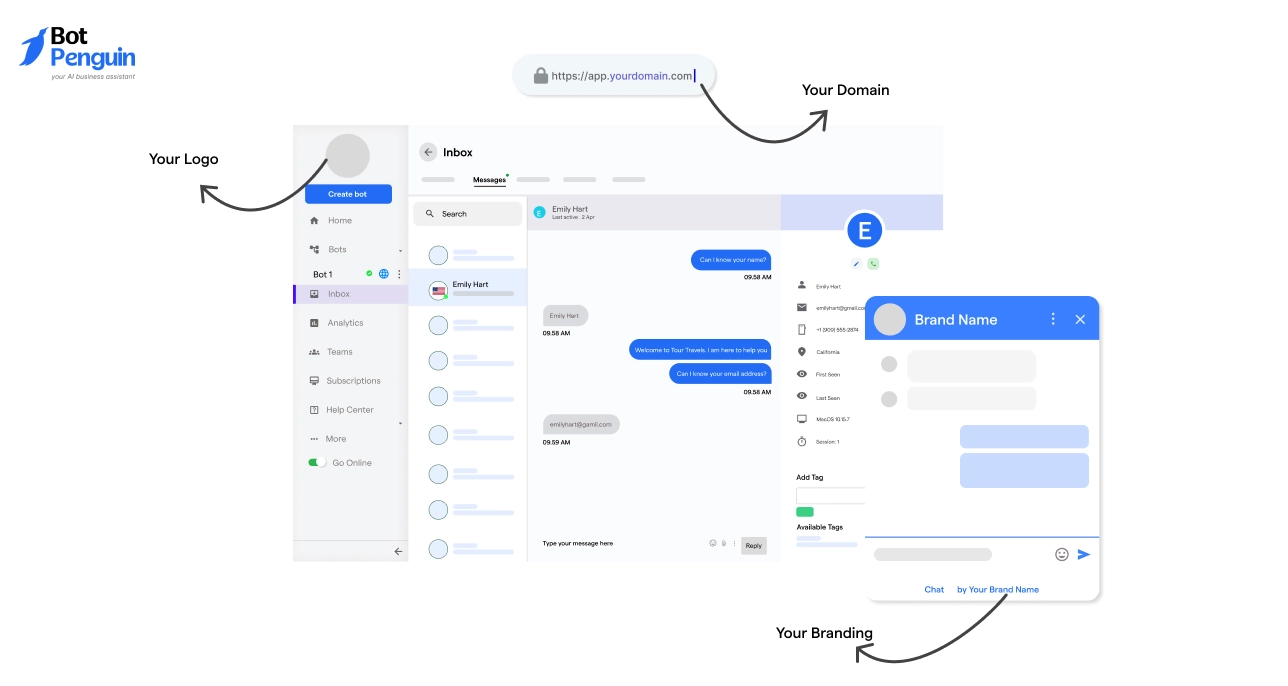
Once your agency is established, the focus shifts to growth and long-term stability. Scaling is not about doing more work but about optimizing systems that already perform well.
The aim is to expand capacity, improve revenue consistency, and maintain client satisfaction.
Automate Client Onboarding and Support
Manual onboarding limits growth as your client list expands. Automating the process saves time and ensures every new client receives a professional experience.
Use AI-driven workflows and structured forms to gather information and configure automations automatically.
For support, use chat systems that handle routine queries while alerting your team for specific cases. This approach maintains quality service while freeing resources for sales and strategy.
Upsell Advanced Automations
Growth also means increasing value for existing clients. Introduce advanced automation options once they are comfortable with your base services. Offer add-ons like CRM integration, WhatsApp automation, or voice-based assistance.
For instance, a logistics company that starts with chatbot automation may later need automated order tracking or reporting.
Build Partnerships and Referral Networks
Strategic partnerships help agencies expand reach faster. Collaborate with marketing firms, SaaS resellers, or consultants who already work with automation-ready clients.
By providing them with automation solutions, you create new income channels while increasing brand visibility. A strong referral network generates continuous business without additional ad spending.
Track Performance with AI Analytics
Data-driven scaling keeps your business sustainable. Use analytics to monitor conversions, client activity, and automation outcomes.
A white label AI automation agency that relies on measurable performance can identify what services bring the best results and adjust accordingly.
Manage Clients with Centralized Dashboards
Growth brings complexity, so managing all clients from one place is essential. White label dashboards give you complete visibility of client automations, reports, and billing.
Scaling a white label AI automation agency is about creating consistency through automation, data, and smart client management.
Once your growth systems are stable, the next step is to equip your agency with the right tools and integrations to enhance performance further. The following section explains which solutions make that possible.
Tools and Integrations That Power White Label AI Automation Agencies
Running a white label AI automation agency means building systems that work for your clients while staying behind the scenes under your brand.
To do this effectively, you need tools and integrations that connect everything — client management, communication, workflows, and analytics.
These integrations are what turn your agency into a true automation powerhouse. They let you design intelligent systems that manage leads, respond to customers, update CRMs, and report progress automatically — all without writing code or handling every task manually.
Let’s look at the key automation areas and the tools that power them.
1. Client and Lead Management (CRM Integrations)
Every AI automation agency starts with clients — and clients come with leads, contacts, and data. Managing these efficiently is the foundation of your business.
When you connect your automation setup with CRMs like HubSpot, Zoho, or Salesforce, you centralize everything: leads from ads, customer data, chat history, and deal pipelines.
Scenario:
Imagine your client runs an eCommerce brand. A new visitor fills out a form on their website.
The CRM automatically records the details, tags it as a “new lead,” and sends the contact to the chatbot flow for instant engagement.
Result:
No lead is lost. The client’s sales team receives ready-to-convert leads, and your agency delivers a system that runs on its own.
Recommended CRM Integrations:
- HubSpot for agencies managing marketing and sales together
- Zoho CRM for service businesses or smaller client accounts
- Salesforce for enterprise-grade client management
2. Communication and Engagement (Channel Integrations)
Your agency’s AI systems need to connect with channels people actually use — WhatsApp, Instagram, Facebook Messenger, websites, and email.
Scenario:
A retail client wants instant replies to order queries on WhatsApp, product questions on Instagram, and support requests on their website chat.
You set up automations across these channels so every message receives an instant, personalized response from an AI chatbot.
Result:
The client never misses a customer inquiry again, and your agency delivers a unified customer experience across all platforms.
Key Integrations:
- WhatsApp Business API for order updates and reminders
- Instagram DM Automation for product queries and engagement
- Website Chat Widgets for real-time assistance and lead capture
- Email Automation Tools for follow-ups and notifications
3. Workflow Automation (Connecting the Systems)
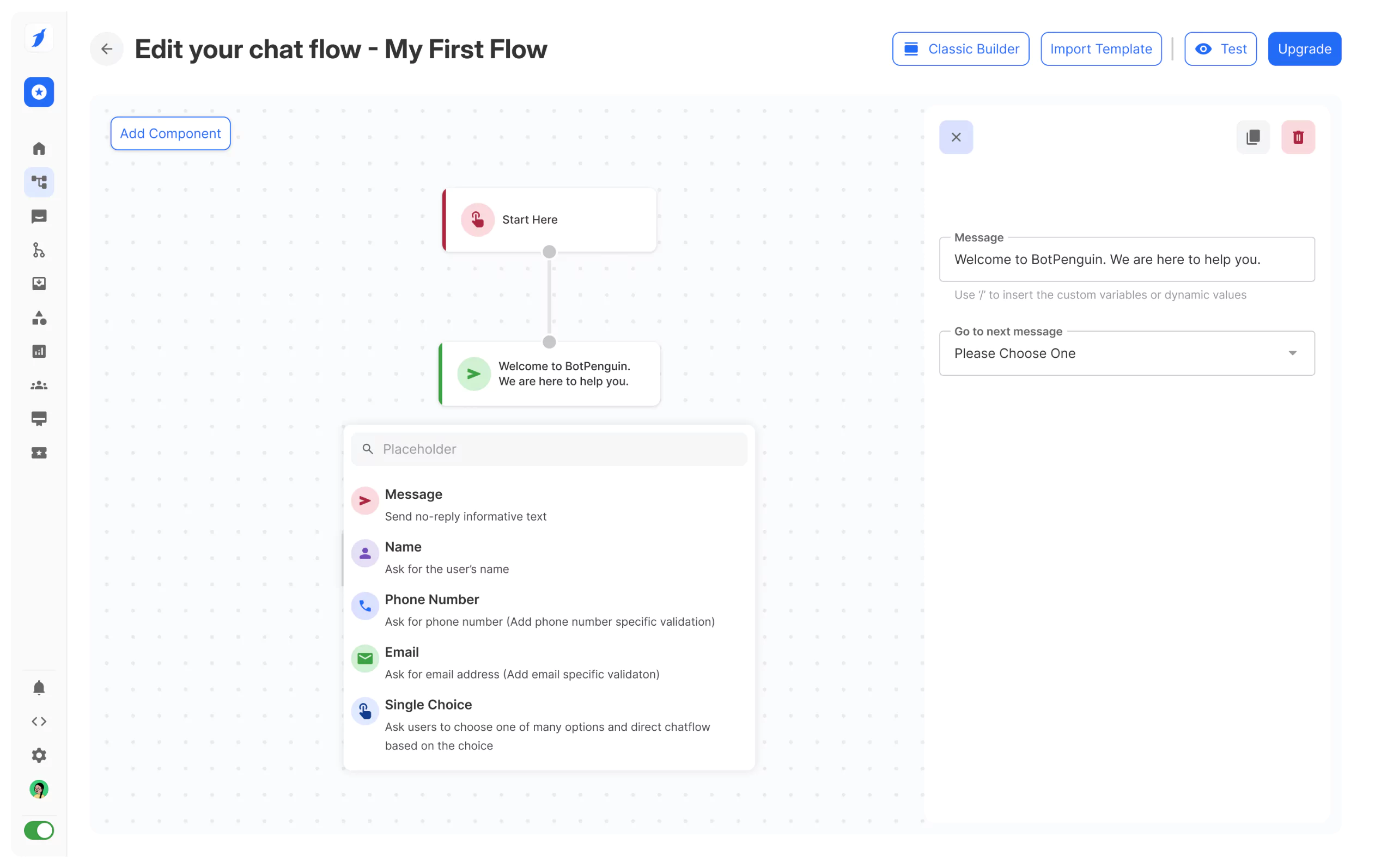
This is where everything ties together. Workflow automation ensures information flows smoothly between apps — from forms to CRMs to communication tools — without human involvement.
Scenario:
A potential lead comes in through a Facebook Ad. The data automatically moves to the CRM, the chatbot greets the lead with a personalized message, and an internal Slack notification alerts the sales team.
Result:
No one has to manually collect data or send follow-ups. The entire process happens automatically in seconds.
Key Tools for Workflow Automation:
- N8N for building custom, logic-based workflows
- Zapier for fast, no-code automation between popular apps
- BotPenguin Integrations to connect chatbots/AI Agents with CRMs, Google Sheets, email, and ticketing tools seamlessly
4. Data, Reporting, and Analytics
For an automation agency, data is everything. It helps you show clients what’s working and where improvements are needed.
Integrating analytics tools gives your clients visibility into leads, conversions, and chat performance.
Scenario:
A healthcare client wants to track how many patients booked appointments through the chatbot each week. The system automatically gathers this data and sends a report to their dashboard.
Result:
You automate and deliver insights. This transparency builds trust and helps clients measure real business outcomes.
Recommended Integrations:
- Google Analytics for tracking website conversions
- CRM Dashboards for lead and sales data
- BotPenguin’s Analytics to monitor chatbot conversations and engagement metrics in one place
5. Managing Multiple Clients Under One Roof
As your agency grows, managing dozens of automation setups becomes challenging.
White label platforms make it easy to handle multiple clients from a single dashboard while maintaining your own branding.
Scenario:
You have ten clients, each using WhatsApp automation, CRMs, and chatbots.
Instead of switching between tools, you manage all their setups under your agency name each with their own sub-dashboard, logo, and access control.
Result:
Your agency looks professional, stays organized, and scales easily without adding new systems for every client.
Unified White Label Management Features:
- Multi-client dashboards
- Branded portals with custom domains
- Centralized analytics and billing control
- Role-based access for team members and client admins
The Big Picture
A white label AI automation agency thrives on systems that talk to each other. CRMs store data, communication tools handle engagement, workflow builders link everything, and analytics turn actions into insights.
When all these parts connect under one white label platform, your agency becomes more than a service provider, it becomes the silent engine behind your clients’ success.
Common Mistakes to Avoid
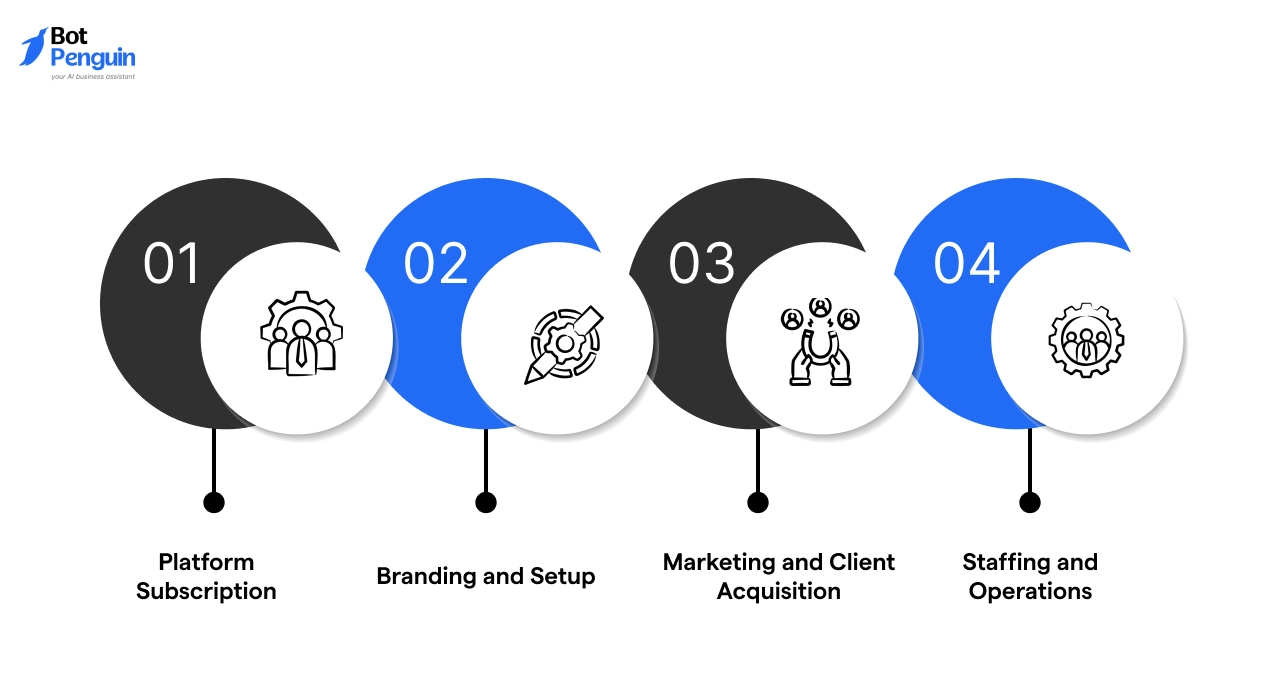
Running a white label AI automation agency requires both planning and consistency. Many beginners enter the market with strong ideas but face challenges that slow their progress.
Most of these issues come from avoidable mistakes related to platform selection, pricing, compliance, and client management. Recognizing these early helps build a more stable and trusted business.
Choosing Unreliable Platforms
The first and most critical mistake is choosing an unstable or poorly supported automation platform. A weak foundation affects everything from uptime to client satisfaction.
Agencies should always evaluate platforms based on reliability, integration options, and customer support.
Selecting a proven provider reduces technical issues and improves scalability. This ensures that your white label AI automation agency mistakes are minimized before they impact your reputation.
Ignoring Data Compliance and Branding
Data protection is a key concern for every client. Ignoring privacy standards or not maintaining secure communication channels can lead to compliance issues.
Always verify that your platform supports data protection frameworks.
Branding is equally important. Many agencies overlook consistent presentation and communication. A clear brand identity builds credibility and helps clients recognize your agency as a trusted partner.
Every report, dashboard, and communication should align with your visual identity.
Underpricing Services
In an effort to attract more clients, agencies often set low prices that do not reflect their service value. This approach may work in the short term but makes scaling difficult later.
Underpricing also leads to resource strain, limited growth, and reduced service quality.
Evaluate your competitors and calculate your costs before defining pricing tiers. Offer service bundles that justify value, such as chatbot setup with CRM integration or analytics dashboards.
Clients prefer clarity and quality over short-term discounts.
Lacking Client Retention Plans
Focusing only on new clients is a common oversight. Retaining clients requires consistent engagement, measurable outcomes, and ongoing improvements.
Without a retention plan, even satisfied clients may explore other providers.
Establish regular review meetings, share automation performance reports, and offer new feature upgrades. Programs similar to an AI reseller program work best when agencies build long-term relationships instead of relying only on acquisition. Loyal clients provide referrals and ensure stable revenue over time.
Avoiding these mistakes builds a reliable and growth-ready business. A structured approach supported by secure tools, strong branding, and realistic pricing keeps your agency competitive.
What is the Cost to Start a White Label AI Automation Agency
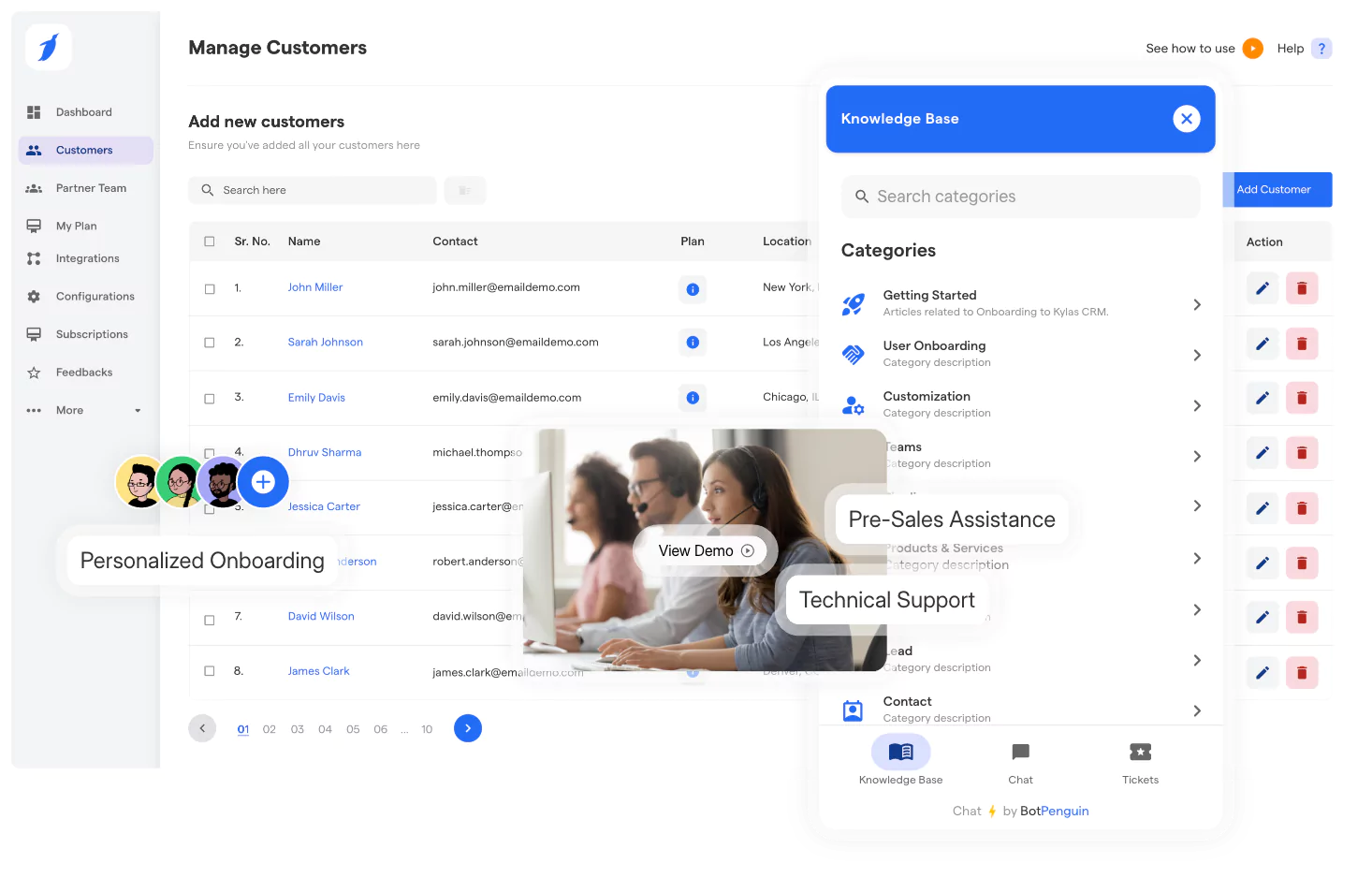
Before beginning operations, every agency owner needs a clear understanding of the costs involved. Building an AI automation agency white label setup is not as expensive as developing your own platform.
The provider handles technical infrastructure, servers, compliance, and updates. Your investment focuses on branding, client acquisition, and running daily operations.
The overall cost to start depends on your service scope and target audience. On average, agencies require an initial investment between USD 1,000 and USD 4,000. Monthly running expenses usually stay within USD 300 to USD 700, covering subscriptions, support, and marketing.
These predictable costs allow agencies to start small, scale quickly, and reach profitability faster than traditional software ventures.
You can start a white label AI automation agency with an initial investment of USD 1,000 to USD 4,000 and monthly operating costs between USD 300 and USD 700.
A white label setup minimizes expenses because infrastructure, hosting, and AI tools are already provided by the platform. Your main costs focus on branding, marketing, and light operational support.
1. Platform Subscription
Most AI automation agency white label platforms charge USD 200 to USD 500 monthly depending on features and client volume.
This covers access to automation builders, chat systems, data integrations, and analytics dashboards.
Scenario: A new agency handling five clients can begin with a USD 250 plan. As the client list grows, upgrading to a USD 400 plan unlocks more automation capacity and reporting features.
Why it matters: Subscription models eliminate heavy development costs and allow agencies to start earning immediately by offering automation services under their own brand.
2. Branding and Setup
Custom branding, portal design, and domain setup typically cost between USD 300 and USD 1,000. This includes logo placement, color customization, and dashboard personalization.
Scenario: An agency may spend USD 700 creating a branded client dashboard that matches its business theme. Clients experience the system as a dedicated product owned by the agency, not a third-party platform.
Why it matters: Strong branding helps build credibility. Clients perceive your agency as an independent automation provider, which supports higher pricing and stronger retention.
3. Marketing and Client Acquisition
During the first few months, marketing and outreach drive client acquisition. Agencies usually allocate USD 500 to USD 2,000 monthly to advertising, SEO, and campaign management.
Scenario: An agency invests USD 1,200 in targeted LinkedIn and Google Ads. Within the same month, it secures three paying clients, each generating recurring income, effectively covering the marketing spend.
Why it matters: Consistent marketing ensures new business opportunities. A few successful conversions often recover initial setup costs within the first quarter.
4. Staffing and Operations
Automation reduces dependence on large teams, but minimal support is still required. Freelancers or part-time professionals can handle sales, onboarding, and customer support.
This typically costs USD 1,000 to USD 1,500 per month.
Scenario: A single assistant managing client tickets and report generation can support five to ten clients efficiently, keeping service quality high and overhead low.
Why it matters: Operating with a small, skilled team preserves profitability and ensures smooth delivery as client numbers increase.
Starting a white label AI automation agency requires moderate investment but delivers strong operational flexibility.
With an estimated setup cost of USD 3,000 and monthly expenses of USD 500, agency owners can operate a complete automation business from day one. The model removes technical barriers, speeds up time to market, and provides predictable costs that scale with growth.
Understanding the initial investment helps plan pricing, capacity, and client targets effectively. Once these foundations are in place, the next focus should shift to building consistent revenue through subscriptions, setup fees, and value-added services.
How Much Can You Earn with a White Label AI Automation Agency
A white label AI automation agency can generate between USD 5,000 and USD 15,000 per month within the first year of operation.
Earnings come from recurring client subscriptions, setup fees, and value-added automation services. Because costs remain steady as client volume grows, the model offers high profitability and long-term scalability.
After covering initial startup costs, agency owners can begin earning from month one. The combination of predictable income, strong margins, and low infrastructure expenses makes this one of the most efficient business models in the AI industry.
1. Subscription Income
Most agencies charge USD 300 to USD 1,000 monthly per client for automation services such as chatbot management, system monitoring, and workflow maintenance.
Subscription income provides a stable monthly revenue stream.
Example: Ten clients paying USD 500 each bring USD 5,000 in recurring revenue every month. With thirty clients, that number increases to USD 15,000 without proportional growth in costs.
Why it matters: Predictable subscriptions ensure steady cash flow, allowing agencies to plan resources and scale operations confidently.
2. Setup and Integration Fees
Each new client requires onboarding, configuration, and branding. Agencies typically charge USD 300 to USD 800 per client as a one-time setup fee.
Example: Five new clients paying USD 500 each generate USD 2,500 in upfront revenue. These setup projects also strengthen client trust by delivering personalized systems.
Why it matters: Setup fees accelerate cost recovery and make client acquisition profitable from the start.
3. Value-Added Services
Agencies can expand income by offering premium services like CRM optimization, custom chatbot scripting, and performance analytics.
These add USD 200 to USD 400 monthly per client to the agency’s recurring revenue.
Example: A client paying USD 400 for automation adds USD 250 for data insights, increasing total revenue to USD 650 monthly.
Why it matters: Value-added services improve retention and client satisfaction, creating steady long-term revenue.
4. Profit Margins and Scalability
White label AI automation agencies maintain profit margins between 60 and 80 percent. Once systems are built, adding clients requires little additional expense, so revenue compounds over time.
Example: An agency earning USD 7,000 monthly while spending USD 700 on operations maintains a 75 percent gross margin.
Why it matters: High margins create financial stability, enabling agencies to reinvest in marketing and service upgrades while sustaining profitability.
Revenue Example Projection
Insight: Even with modest pricing, an agency can reach six-figure annual earnings by maintaining consistent client acquisition. Each additional client adds recurring income with limited operational strain.
A white label AI automation agency builds recurring, scalable revenue through subscription plans, onboarding fees, and premium service upgrades.
The model’s structure supports strong profit margins and predictable growth without requiring additional infrastructure or large teams.
Understanding the revenue potential provides clarity on pricing, client targets, and profit expectations. The next section will cover how agencies can sustain these results by avoiding common mistakes in automation delivery and client management.
Real World Success Stories of White Label AI Automation Agencies
White label AI automation agencies are redefining how businesses scale their operations.
By running automation systems under their own brand, agencies deliver faster results, reduce manual work, and improve client satisfaction while maintaining full ownership of their services.
The following examples show how different agencies have implemented white label automation successfully across industries.
Marketing Agency Enhances Client Retention and Productivity
A mid sized marketing agency transitioned its client management system to a white label automation platform. Through AI powered chat and reporting tools, it automated campaign tracking, client onboarding, and lead engagement.
Within six months, measurable improvements included:
- 45 percent higher client retention through faster communication
- 30 percent improvement in project onboarding speed
- 25 percent reduction in manual reporting and follow ups
By automating data collection and communication, the agency managed twice the number of client accounts without expanding its team.
Real Estate Automation Agency Expands Nationally
An automation agency serving property firms developed customized chat and CRM automations for its clients under its own white label dashboard.
The system qualified leads, scheduled site visits, and followed up automatically.
Results achieved within a year:
- 60 percent increase in qualified leads
- 25 percent growth in property sales
- Entry into five new cities using the same automation framework
Each real estate client managed thousands of monthly inquiries with consistent response times and better lead quality, improving both agent efficiency and deal conversion.
E Commerce Automation Partner Improves Client Conversions
An AI automation agency working with online retailers deployed branded chatbots that handled product recommendations, abandoned cart recovery, and basic customer support.
The solution was built and managed entirely within the agency’s white label interface.
Within three months, clients recorded:
- 80 percent faster response times
- 35 percent increase in checkout completion rates
- 70 percent of customer queries resolved through automation
The agency created a repeatable automation structure that each client could personalize for their own brand, improving customer satisfaction and reducing support costs.
Customer Support Agency Reduces Costs and Increases Efficiency
A support process outsourcing agency modernized its ticket handling and escalation system using white label workflow automation.
White Label AI Agent categorized, routed, and responded to tickets without human assistance.
Chat based AI agents categorized, routed, and responded to tickets without human assistance.
Performance improvements after deployment:
- 40 percent lower operating costs
- 50 percent faster resolution of support requests
- 30 percent higher client satisfaction ratings
Automation enabled the agency to manage a larger client base with the same staff size while maintaining service quality and response consistency.
Key Takeaways for Agencies
These results demonstrate that white label AI automation is not limited to any single industry. Marketing firms use it for campaign and client communication.
Real estate agencies use it for lead management. E commerce partners use it to handle sales support. Customer service providers use it for ticket routing and analytics.
Automation allows agencies to scale operations, deliver consistent outcomes, and strengthen client relationships without increasing workload.
For agencies building long term value, adopting white label automation is a direct path to efficiency, control, and measurable growth.
Final Thoughts
Building a white label AI automation agency is one of the most practical and future-ready paths to enter the AI market.
It allows entrepreneurs and service providers to launch under their own brand, offer intelligent automation to clients, and scale without heavy investment in technology or infrastructure.
The benefits are clear: faster time to market, recurring revenue opportunities, and the freedom to expand across industries with minimal setup.
The AI landscape is growing rapidly, and agencies that start now position themselves ahead of the curve. Businesses everywhere are seeking partners who can automate operations, manage workflows, and improve customer engagement.
Owning a white label AI automation agency lets you be that partner — providing high-value solutions while growing your brand authority and income.
BotPenguin provides the foundation for this journey. With its ready-to-use automation tools, integrations, and partner ecosystem, it helps you launch and manage your white label AI automation agency confidently.
Now is the ideal moment to take the first step, build your own automation brand, and begin delivering intelligent solutions that create lasting impact.
Frequesnlty Asked Questions (FAQs)
What factors influence the earning potential of a white label AI automation agency?
Earning potential depends on client volume, service pricing, and operational efficiency.
Agencies that build recurring subscription models and maintain strong retention achieve higher and more consistent monthly income.
How can a white label AI automation agency attract high-value clients?
A white label AI automation agency can attract premium clients by targeting industries such as real estate, healthcare, and eCommerce, showcasing automation case studies, and offering measurable performance results.
What payment models work best for a white label AI automation agency?
The most effective payment models for AI automation agency white label setups combine monthly subscriptions, setup fees, and success-based incentives that align with client outcomes and retention goals
How long does it take for a white label AI automation agency to become profitable?
Most white label AI automation agencies reach profitability within three to six months after onboarding their first recurring clients and recovering setup and marketing investments.
How can an AI automation agency white label increase revenue without adding more clients?
An AI automation agency white label can increase revenue by upselling advanced analytics, offering consulting services, and introducing higher-tier automation packages to existing clients.
